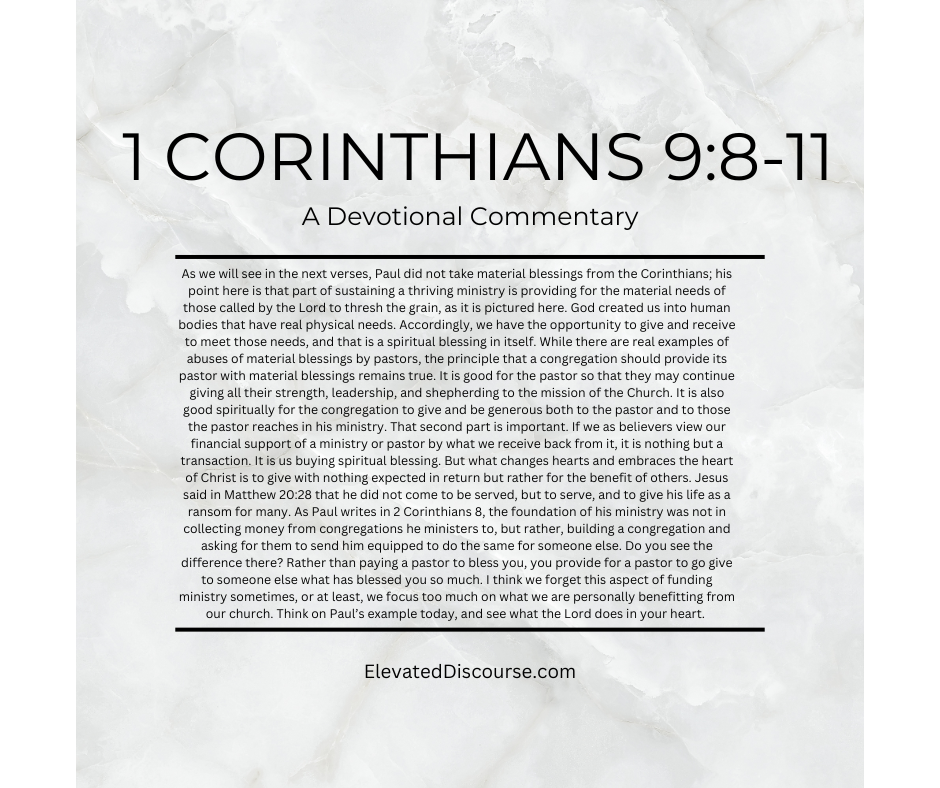1 Corinthians 9:8-11
- Elevated Discourse
- Sep 16, 2025
- 4 min read

Scripture: 1 Cor. 9:8 Do I say these things on human authority? Does not the Law say the same?
1 Cor. 9:9 For it is written in the Law of Moses, “You shall not muzzle an ox when it treads out the grain.” Is it for oxen that God is concerned?
1 Cor. 9:10 Does he not certainly speak for our sake? It was written for our sake, because the plowman should plow in hope and the thresher thresh in hope of sharing in the crop.
1 Cor. 9:11 If we have sown spiritual things among you, is it too much if we reap material things from you?
Teaching: Paul is speaking on the topic of financial support of the church, and in particular, the pastors of a church. Here, he calls back to the Old Testament Law to illustrate the purposes and Word of the Lord on this subject. In verse 9, Paul references Deuteronomy 5:4, part of the Law, that says “You shall not muzzle an ox when it treads out the grain.” What is he talking about here?
First, we need to understand what an ox does while treading out the grain. In those days, when grain was harvested, the grain needed to be separated from the chaff and husk around it. What they would do is lay the grain on a hard floor with a pole in the middle. They would tie an ox to that pole and have the ox walk in circles around the pole, crushing the grain beneath its hooves. This would leave the grain seed intact but separate the husk and chaff, which they would collect afterwards to make bread.
But picture this: the ox is working hard, treading the same circle over and over in order to provide nourishment for others. What a picture of ministry! In the course of this work, the ox might get hungry and feed on the grain to some extent. If one muzzled the ox though, this was not possible. Thus, if one muzzled the ox, one would maximize profitability, ensuring no lost grain, but at the expense of the ox — the ox would grow weak and thus unable to continue threshing. The Law prohibited this: the little bit of grain that was needed to keep the ox strong created a harvest much larger in the long term.
By appealing to this part of the Law, Paul is demonstrating that it was always God’s intention that the people who have been blessed spiritually by a ministry leader should give some level of material blessing to the ministry leader. This law was meant as a picture of this and to teach this principle in their society. In verse 11, Paul asserts that spiritual blessings are of much greater importance than material blessings; however, some modest level of material blessing is needed to keep the spiritual harvest going.
Takeaway: As we will see in the next verses, Paul did not take material blessings from the Corinthians; his point here is that part of sustaining a thriving ministry is providing for the material needs of those called by the Lord to thresh the grain, as it is pictured here. God created us into human bodies that have real physical needs. Accordingly, we have the opportunity to give and receive to meet those needs, and that is a spiritual blessing in itself. While there are real examples of abuses of material blessings by pastors, the principle that a congregation should provide its pastor with material blessings remains true. It is good for the pastor so that they may continue giving all their strength, leadership, and shepherding to the mission of the Church. It is also good spiritually for the congregation to give and be generous both to the pastor and to those the pastor reaches in his ministry. That second part is important. If we as believers view our financial support of a ministry or pastor by what we receive back from it, it is nothing but a transaction. It is us buying spiritual blessing. But what changes hearts and embraces the heart of Christ is to give with nothing expected in return but rather for the benefit of others. Jesus said in Matthew 20:28 that he did not come to be served, but to serve, and to give his life as a ransom for many. As Paul writes in 2 Corinthians 8, the foundation of his ministry was not in collecting money from congregations he ministers to, but rather, building a congregation and asking for them to send him equipped to do the same for someone else. Do you see the difference there? Rather than paying a pastor to bless you, you provide for a pastor to go give to someone else what has blessed you so much. I think we forget this aspect of funding ministry sometimes, or at least, we focus too much on what we are personally benefitting from our church. Think on Paul’s example today, and see what the Lord does in your heart.









Comments